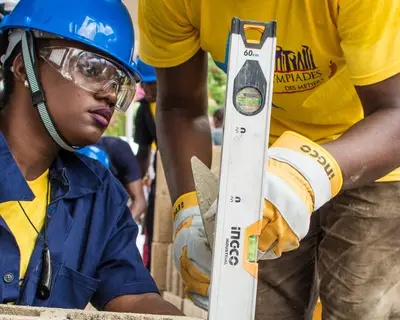PORT-AU-PRINCE, Haiti– Students from Haiti’s top vocational trade schools recently participated in a two-day competition to show off valuable new skills to private sector employers that they learned attending technical vocational education and training institutes.
The Olympiades des Métiers, or “Skills Olympiad”—organized by the Order of Haitian Engineers and Architects, the Collège National des Architectes et Ingénieurs d’Haïti (CNIAH) and the USAID Local Enterprise and Value Chain Enhancement (LEVE) project ─ provided an opportunity for trade students preparing for graduation to showcase their skills to potential employers.
Haiti’s population is approximately 10.5 million people. More than 20 percent of the population are youth, between the ages of 15-24. According to World Bank statistics, Haiti’s youth unemployment rate is more than 30 percent. With these odds it is very difficult for youth to find employment. The USAID LEVE project helps increase the odds of youth finding jobs by working with Haitian technical vocational education and training institutes (TVETs) to focus curricula on skills needed in the market now and in the near future. The Skills Olympiad provides a perfect venue to strengthen the link between TVETs, their soon-to-be graduates, and Haitian employers.
“We are proud to work with USAID, and the Haitian private sector, through the LEVE project to help Haiti’s youth fulfill their potential,” said Philip Schwehm, vice president for governance and economic development at RTI International. “By helping youth acquire in-demand skills, we can reduce youth unemployment, expand job and career opportunities, and support growth in the country’s key sectors.”
The student participants journeyed from all over Haiti to compete and demonstrate their skills in electricity, plumbing, and masonry to 20 private sector employers. The competition, loosely developed in the image of SkillsUSA, let participants apply their specialized skills to real world situations and connect with potential future employers. Several students received job offers on the spot.
Kayleen McCabe, a licensed contractor, key member of SkillsUSA, speaker at World Skills 2016, and world famous TV star of DIY Network's “Rescue Renovation”, attended the Olympiad. McCabe helped to raise awareness about the economic importance of technical trades, the opportunities they present to youth, and the ability for young woman to work in the trades.
Kayleen told the LEVE team, “It’s so great seeing students learning a skill that won’t only have positive impacts on their communities; they'll provide economic stability for these students because they’re in demand.”
Many trade schools in Haiti do not have the networks or resources to connect their students with jobs once they complete their studies. To addresses this workforce skills gap, the LEVE project builds the capacity of vocational schools to update curricula based on market needs, creates linkages with the private sector for possible job placement, and has developed a student tracer database to connect alumni with students ready to graduate. Beyond the workforce, LEVE also supports job creation by stimulating private-sector investment in micro- small- and medium-sized enterprises in the agribusiness, construction and apparel and textiles sectors.
“The ‘Skills Olympiad’ is just one example of how LEVE makes positive change in the lives of Haitians,” said Robin Padberg, Chief of Party of the USAID LEVE Project.
The project also breaks down gender barriers. Women who participated in this year’s Skills Olympiad had the chance to demonstrate their skills and challenge gender norms in a sector traditionally dominated by men.
“People in this work are always saying that women can’t do anything, that we should be nurses or work in trades with safer environments,” said Astride Sophonie, who won second place in the electricity competition. “Now I can show them that there is nothing we women can’t do.”
Download our brochure on Workforce and Economic Opportunity for more information on RTI’s work in youth and workforce development in Kenya, the Philippines, El Salvador, Indonesia and beyond.

- Students from Haiti’s top vocational trade schools recently participated in a two-day competition to show off valuable new skills to private sector employers that they learned attending technical vocational education and training institutes
- The Olympiades des Métiers, or “Skills Olympiad”—organized by the Order of Haitian Engineers and Architects, the Collège National des Architectes et Ingénieurs d’Haïti (CNIAH) and the USAID Local Enterprise and Value Chain Enhancement (LEVE) project ─ provided an opportunity for trade students preparing for graduation to showcase their skills to potential employers
RTI International Media Relations:
As an independent, scientific research institute with a mission to improve the human condition, RTI International is engaged by clients and partners to conduct evidence-based research and project implementation. We share our work in line with journalistic and scientific standards and maintain a record in RTI’s Newsroom.
RTI International is an independent scientific research institute dedicated to improving the human condition. Our vision is to address the world's most critical problems with technical and science-based solutions in pursuit of a better future. Clients rely on us to answer questions that demand an objective and multidisciplinary approach—one that integrates expertise across social, statistical, data, and laboratory sciences, engineering, and other technical disciplines to solve the world’s most challenging problems.
For more information, visit www.rti.org.
